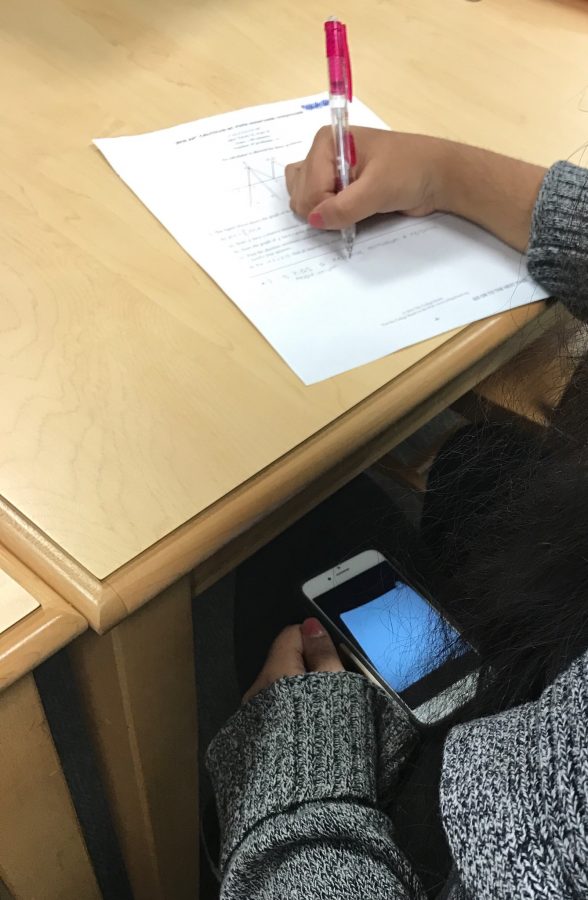Be the top of your class or stick to your morals?
Eyes red, muscles tensed, hands clammy, students struck with anxiety during the test distribution process rapidly try to think over all of the broad subtopics of the unit. The nervousness that tests and grades cause puts a burden over every student because of the importance colleges place on GPA during the acceptance process. Some students, typically the ones taking more than 4 AP classes, strive for acceptance into the most renowned universities, which generally have acceptance rates lower than 50%. These high goals inevitably brew competition within the class, and schools with class ranks naturally see more competition and stress.
Lambert High School consists of students of all types. The most motivated and productive students are commonly the most competitive, leading them to take several AP’s in school and online – sometimes even secretly. After racking up a huge number of AP’s, the students in the top 10% of the class generally have GPAs that vary in the tenths. This builds tension, which soon transfers to desperation to receive the best grades in the class.
“When all of your friends have almost the same GPAs as you, there are many secrets between you because everyone wants to be the best. We also try to help each other by telling each other what is on the test, which I guess is considered cheating,” states a student who wishes to remain anonymous.
The extensive workload poses the issue of time, which there clearly is not enough of in a day. With sometimes having more than two tests and quizzes in a day, it becomes difficult for students to devote enough study time to each one. This issue is the driving force that compels students to casually look over their shoulders at their friends’ papers during tests. In a study presented by Kimberly A. Geddes in “Academic Dishonesty Among Gifted and High-Achieving Students,” it is shown that the top academic reasons for cheating are heavy school workload, too many tests in one day, and lack of guidance from the teacher; 60% or more students agree with these listed reasons. The most commonly agreed to motivations for nonacademic reasons with over 45% of students in agreement are helping a friend, lack of effort, and shortage of studying. Students feel burdens in many different aspects, with both academic and nonacademic reasons to back up their dishonesty.
Academic dishonesty does not reign only among tests. It also occurs in response to worksheets, anything perceived as busywork, and homework.
“I just don’t see the point in doing the same problems over and over. Most of the time the work that teachers give are repetitive and take time off of other homework I may have. Basically most of us have the mentality that ‘I hate the fact that I have to do this so I’ll just find the easy way out,’” says another high ranking Lambert student, who has asked to remain anonymous.
This mentality, although debatable, is not uncommon at Lambert. From a cheating survey taken in March 2016 by the Lambert Post, many submissions said that the student believed that getting information about the test from friends is not considered cheating, while copying and pasting something to turn in for a grade and peeking during the test is wrong. Out of the 35 students that were sampled, 69% said that getting information about a test beforehand is not considered cheating. Many students underestimate this form of cheating, and it happens on an everyday basis. 80% of the random sample said that peeking during a test is cheating, and 91% said that copying and pasting is plagiarism. This data proves that students typically do understand that cheating and plagiarism are prevalent, but not all types of cheating are known to be as bad among the student body.
While students have their own methods of surviving the workload of four to six AP courses, teachers describe a frustration of the “chess game” they must play in response to academic dishonesty. Teachers at Lambert have to prepare several versions of tests to combat the Groupme share groups where students give each other a heads up about test questions; they have to watch the use of phones on testing days to combat pictures being quickly snapped; they must use plagiarism detectors to deter students from actively copying and pasting from the internet. The biggest complaint among teachers is that despite their efforts, their students find new and inventive ways of cheating. It is an exhaustive cycle of cat and mouse. Academic dishonesty strips students of their true potential, and it can lead to consequences such as 0s on assignments and a lower GPA. At the college level, consequences can be as harsh as expulsion.
Mr. Teeple, a Calculus teacher at Lambert, firmly stands by his negative opinion on cheating:
“On the few instances when I have caught a student cheating, the very first aspect I discuss with the student is what is the point of cheating? Obtaining a successful result through cheating robs yourself of any gratification because you didn’t earn the success. One of my favorite examples is to ask a student to imagine they are running a race. If I tell you that you ran the fastest time you have ever run in your entire life, but, I haven’t told you yet in what place you finished the race, can you be satisfied? Running a personal best and finishing last is more impressive than winning by cheating. I would encourage students to understand this principle applies to academics as well. The honor and sense of pride in studying hard yet making a B or C in a class dwarfs the emptiness of pretending you made an A because you cheated.”
The long-term cons of cheating definitely outweigh the short-term “benefits”, and the act itself is not one of compromise at Lambert High. At the end of the day, it all comes down to one’s morals and the decision to follow them through. While some students constantly listen to the devil on their shoulder, there are also others who work day and night, continuously grinding, to please the angel on their’s. A good example of a hard working student that never fails to speak out against the academic dishonesty in the classroom is Emily Mazor. Emily is taking 5 AP classes, and she adamantly refuses to cheat in order to maintain a GPA.
“I see cheating happening all the time. Sometimes I’ll be taking a test, and when I look up, the people around me are sneakily looking at each other’s papers. I think this is really unfair to the people who actually do their homework and study for the test when they still end up getting lower scores than the people who didn’t study and rely entirely on cheating. It definitely gives people an unfair advantage, and it’s even more frustrating when teachers don’t care about the issue,” Mazor states.
Emily brings up a good point here. Students who feel that academic dishonesty is okay think that they can get away with the offense, but the guilt is never truly gone. However, there are certain teachers who really take this issue into consideration, and they have strict honor codes that they follow in order to minimize it as much as possible. For example, Mrs. Clori Rose, an AP American Lit Lang/Composition and Journalism teacher at Lambert, emphasizes an honor code in her classes. For example, before each test, her students write an honor agreement, which states that they will not discuss the content of the test with anyone. This allows for the students to think over their actions before they commit them, and perhaps they would feel even more guilty if they still were to cheat. Honor codes, such as this, can be extremely effective.
In “What Colleges Teach Students about Moral Responsibility? Putting the Honor Back in Student Honor Codes,” Elizabeth Nuss states, “Research indicates that there is less reported cheating on campuses with honor codes (May & Loyd, 1993; McCabe & Trevino, 1993) and students report a greater likelihood that they will report violators if institutional regulations require reporting.” Not only would stricter honor codes tug on the heartstrings of the cheaters and inflict more guilt, it would also provoke other students to call them out. Ultimately, academic dishonesty is an ethical issue, and honor codes have the ability to help a student stop and reflect before making a bad choice.
If Lambert High School were to enforce a clearly defined honor code, the frequency of cheating would ultimately decrease, for students would begin to think over their morals and refrain from the burden of guilt that would build if they were to carry out the misdeed. Hardworking students that remain principled and right-minded deserve to rise to success, without the cheaters that feed off of them bringing them down. Cheating is a wrongful issue that some even believe to be sinful, and the level of moral culpability in which cheaters are willing to take part in all comes down to them: are they willing to risk their respect for themselves and the respect for others for just one grade or will they compete and finish this race knowing that they did it on their own?
Your donation will help support The Lambert Post, Lambert High Schools student-run newspaper! Your contribution will allow us to purchase equipment and cover website hosting costs.













